Since May 2nd, Burundian politicians have been busy campaigning for or against the revision of the Constitution throughout the country. According to the presidential decree of April 24, political parties and independents will have to run a campaign and convince Burundians to vote for or against the new Constitution until May 14. Iwacu reporters who were on the ground describe the atmosphere that prevailed at the beginning of this campaign.
CNDD-FDD: The beginning of campaign “marked by divine grace”
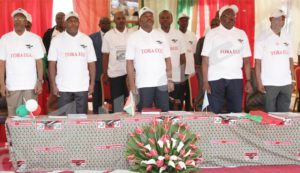
All the heavyweights of the party have responded to the launch of the campaign.
The ruling party CNDD-FDD launched its campaign for the May 17 referendum on Wednesday May 2. It unsurprisingly called the population to vote “Yes”.
“A meeting that no Mugumyabanga (member of CNDD-FDD) should miss,” said Evariste Ndayishimiye, Secretary General of the party.
Military and police armed to the teeth ready to stop anything or anyone that could disrupt the ceremonies and the Imbonerakure (youth of the ruling party) around the track leading to the small stage prepared to host the ceremonies could be seen in Bugendana commune of Gitega province.
The organizing committee has worked hard to make this event a success.
The place might have not been chosen randomly. In August 2017, in the same commune, all Bagumyabanga chose to place God above all their projects. “Another proof that the present referendum, which is the result of the divine will, is already won in advance,” said a Mugumyabanga anonymously.
A major turning point for the rebirth of a new Burundi, the “Yes” vote will mark an era of “an independent Burundi, responsible for its own development and not submissive to the injunctions of the whites,” says Ndayishimiye.
He also says the new Constitution will ensure peace. Besides the fact that it emanates from people’s desiderata, it is a return to the roots that listen to the voices of the grass roots.
Call to be good models
In such a delicate period where there are no holds barred to win, Pierre Nkurunziza, President of the Republic and supreme guide to all Bagumyabanga, urges them to overcome provocations and be good examples. “I know that sometimes it’s hard not to respond to provocations, but this is the time to be exemplary and true peaceful campaigners.” A wink that comes after the arrest and imprisonment of Melchiade Nzopfabarushe, one of the prominent members of the ruling party , on the eve of the launch of the referendum campaign, for incitement to hatred.
President Nkurunziza says the present referendum which is marked by divine grace, is the right moment for any Mugumyabanga to stand up for the safeguard of national sovereignty. “Like our forefathers, we must be valiant for this is a divine will. He warned anyone who would wish to undermine this process saying they would face the wrath of God. As to what they should vote, he told them to follow his example by voting “Yes.” This, however, must not prevent others from voting according to their wishes, he said.
UPRONA, UPD Zigamibanga parties to vote ‘YES’
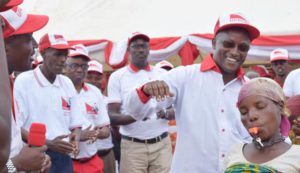
Leaders of UPRONA are for the amendment to the Constitution
Leaders of UPRONA party officially recognized by the government went to Nyabiraba, Bujumbura province for the launch of the election campaign. The president of this party, Abel Gashatsi, has said he is for “Yes” to the revision of the Constitution. According to him, UPRONA agreed to vote “Yes” in the constitutional referendum because of the 307 articles that compose the 2005 Constitution, 292 remained in the new project.
The others have become anachronistic and therefore deserve to be deleted or updated, he said. Gaston Sindimwo, First Vice-President of the Republic from this party, has said UPRONA significantly contributed to the preparation of this new Constitution.
The chairman of Sahwanya FRODEBU Nyakuri party was on Wednesday May 2, in Ntega commune of Kirundo province. In his speech, Kefa Nibizi asked all the militants of his party in the country and elsewhere, to massively vote “Yes” to the project of the Constitution which, according to him, emanates from the will of the Burundian people. “The proposed amendments to the new Constitution exactly meet the aspirations of our followers”.
In a press conference held on Wednesday, Abdoul Kassim, Chairman of UPD Zigamibanga party said the new Constitution will strengthen political parties. “The dissensions observed in political parties will decrease significantly.
For him, the competence given to the President of the Republic to appoint members of the government without taking into account the results of their political parties, but the individual skills of each, denotes the will to fight exclusion.
Agathon Rwasa sticks to his guns: “Vote No”
At the launch of the referendum campaign, on Wednesday May 2, in Ngozi province, Agathon Rwasa called on his followers to vote against the draft constitution. According to him, it favors some Burundians to the detriment of others.
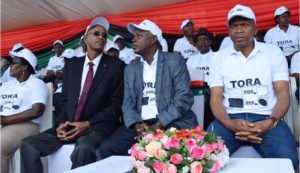
Agathon Rwasa: They only aim to exclude me in the next elections.
It is a march of the militants of Amizero y’Abarundi opposition coalition that began the entry into the city of Ngozi (the stronghold of President Pierre Nkurunziza) from Muyinga at 12:30. Young people and old ones from all over the country were on the national road number 6 heading to Muremera stadium.
Slogans and songs alternated calling on Burundians to overcome fear and vote no. “Vote No for Justice, Peace and Sustainable Development.” They praise the bravery of their leader Agathon Rwasa, comparing him to Nelson Mandela. “Let us live in democracy which does not exclude anyone, “they chanted.
They tirelessly made a one-kilometer climb without running. As they advanced, other supporters joined them in ranks. Having arrived at Ngozi market, the crowd was joined by dignitaries of Amizero y’Abarundi coalition including parliamentarians. From there, they displayed a banner bearing the theme: “We reject a Constitution whose provisions exclude Burundians. Vote no. ”
Pierre Célestin Ndikumana, president of Amizero y’Abarundi’s parliamentary group, was there. He was in front, coordinating activities. Police forces ensured the smooth running of the event. Some inhabitants of Ngozi did not believe their eyes. “Finally, the coalition is really alive. It dares to call on people to vote no, “wonders a passer-by. Another said: “This is the real political opposition. We did not expect that. ”
For nearly an hour, the activists arrived at Muremera stadium. They continued to express loudly their hostilities to the new Constitution while waiting for the great moment: The coming of their leader. Other imminent members of the coalition like Dr. Yves Sahinguvu, Former first Deputy President of the Republic and Prof. Evariste Ngayimpenda, vice-president of this coalition preceded the arrival of the president.
A secretly prepared Constitution
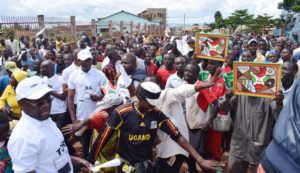
Activists chanting slogans against the draft Constitution.
The First Deputy-President of the National Assembly appeared under heavy escort. The big moment has arrived. It is after the prayer and welcoming speech that the leader of Amizero y’Abarundi started speaking. Agathon Rwasa, himself a native of Ngozi, does not beat around the bush. “We will vote” no “to the draft Constitution. From the outset, he has said the draft Constitution is a document that has long been kept secret. “I received this document on the eve of the launch of the referendum campaign. It has not been made public.
In addition, he indicates that its preparation was not inclusive. The Amizero y’Abarundi coalition had only one representative in a 15-member-commission. He added that no minister from his coalition has ever been involved in explaining the content of the project. “How can we vote for a Constitution with which we have not been associated,” Rwasa said.
In addition, he said, to be appointed to the highest positions, this project requires that any candidate must not have any other nationality except the Burundian one. For him, this project only comes to exclude some to the detriment others. Our coalition advocates the reconciliation of all Burundians, Rwasa said.
On the basis of Article 288 he has said Burundi will be governed by two Constitutions: “Pending the establishment of the institutions resulting from the elections in accordance with this Constitution, the institutions in place remain in office until the effective establishment of new elected institutions.”
However, he feared, there is no guarantee that the current institutions will continue. Any law, he recalls, enters into force on the day of its signature and a Constitution takes effect from the day of its promulgation.
The first deputy-chairman of the lower chamber of Parliament is worried about how to vote and pass laws. For him, the absolute majority that has been retained is likely to make the laws pass like letters to the post office. The status of representative of the people is demeaned. The Speaker will have the flexibility to put pressure on Parliament whenever s/he wants to pass legislation that benefits them.
He strongly denounces the fact that the president will take an oath before the Almighty. For him, it is a way to lead Burundians to one religion and therefore preach against the principle of secularism of the state.
He also said that the draft Constitution establishes impunity. Article 50 provides that no Burundian may be extradited.
He also denounces Articles 81, 85 and 86. According to this elected representative of the people, these provisions contradict each other as to the formation of coalitions and independents. “They only target my exclusion in the next elections.”
Rwasa defends the Arusha Agreement
For Agathon Rwasa, the Constitution in force allowed the return of peace. “I totally embrace the spirit and the letter of this Constitution, fruit of the Arusha Accords even if I was not there.” He believes that this Constitution has taken the country out of ethnic divisions. According to him, what has always harmed Burundians is lawlessness.
“There are no Burundians who fled and refused to return because of the Constitution in force,” he said adding that democracy implies diversity of opinions and ideas. “We must strive to find more what unites us. We disagree with bad political governance. “In the end, Rwasa urges his activists to avoid any provocation or aggression towards other political opponents. He calls on future representatives to the polling stations to be vigilant and denounce any fraud: “We must ensure the smooth running of the referendum.”
Léonce Ngendakumana, calls for a “No Vote”
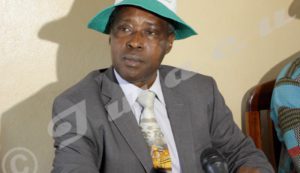
Léonce Ngendakumana, Chairman of Sahwanya FRODEBU: “The new Constitution will allow the president to remain in power forever, which is contrary to the Arusha Agreement…”
At a press conference on Thursday, May 3, Léonce Ngendakumana, Deputy Chairman of Sahwanya FRODEBU party referred to this referendum as “a referendum of all dangers.
“We therefore call on our followers to vote ” No ” to safeguard the Arusha Agreement and the resulting Constitution,” he said adding that there are reasons to campaign for the “No Vote”.
He regretted that the new Constitution did not refer to the Arusha Agreement. Given the causes and realities that gave rise to this agreement, it is not the moment to do away with the Arusha Agreement and change the existing Constitution. “National reconciliation has not yet been achieved.”
He adds, moreover, that the new Constitution contains serious flaws that endanger the nation. “It puts at risk the secularism of the state and the separation of powers.” He emphasizes the reduction of the quorum of decision-making in the National Assembly at 50% plus one vote, “which will favor the vote of repressive laws”.
In addition, Léonce Ngendakumana deplores the fact that the new Constitution institutionalizes and encourages impunity of crimes. “No Burundian can be extradited. Burundi risks becoming a hotbed of criminals.” He concluded:” We will vote “No” to the new Constitution which we consider untimely. ”
Reactions
CECAB: “The current context is not propitious for an amendment to the Constitution
The Conference of Catholic Bishops of Burundi- CECAB is worried about the amendment of the Constitution in the current context saying it is not an opportune moment to do so.
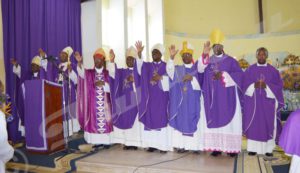
Burundi Catholic Bishops: “Burundians should vote freely “Yes” or “No” without any pressure”
“It is questionable whether the provisions of Article 299 of the Constitution which currently governs us have been sufficiently taken into account”, said the Burundian bishops in a statement issued on Wednesday May 2, the first day of the campaign for the constitutional referendum. According to them, this article stipulates mainly that no procedure of revision of the Constitution can be retained if it undermines national unity, the cohesion of the Burundian people or reconciliation.
This is the case because this draft Constitution seems to have exacerbated disagreements instead of uniting Burundians, say the bishops. Since 2015, they continue, divisions have broken out in many political parties, including the one in power, and the governing bodies of the country as well.
“To date, no solution has been found to this problem since the efforts of dialogue that were to bring them closer have not been successful.” This is a shame because, according to them, the concord or division of the population depends on the political class.
Conscience awakening is necessary
Another reason advanced by these Catholic Bishops is that since 2015, many Burundians have fled the country, including members of this political class. “It is true that there are some of them who have responded to the call of the authorities of the country and have returned.” However, they find that many have not yet returned for various reasons and therefore they will not be able to express themselves on this draft Constitution.
Moreover, these bishops speak about the fear that reigns in the country because of the language and behavior of some Burundians who use violence or abuse the authority they have to take away freedom of expression and opinion of their political opponents. “People do not dare to say openly what they think for fear of reprisals. All of this is part of what is raising our concern about the amendment to the Constitution in the current context “.
For these bishops of the Catholic Church, an awakening of conscience is necessary so that “we all give priority to the good of our country.” The bishops deplore the fact that the democratic process has been put to the test since 2015 despite a considerable step already taken in matters of democracy.
They urge all Burundians to safeguard unity and peace and wish that the referendum be conducted in peace and freedom so that Burundians can vote freely “Yes” or “No” in the referendum without any pressure.
“The government will not argue about an opinion specific to Catholic bishops,” said Philippe Nzobonariba, Secretary General of the government. According to him, they had expressed the same thing in 2015. “The population must have a opposite opinion. We’ll see on May 17, 2018. ”
The US concerned about the constitutional referendum process
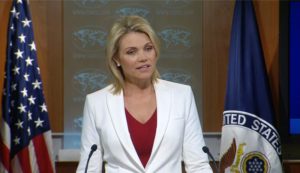
Heather Nauert : The amendments to the Constitution will be interpreted as a resetting of the presidential term limits and run counter to the Arusha Agreement.”
Washington judges the constitutional referendum process as non-transparent. “The amendments to the Constitution will be interpreted as a resetting of the presidential term limits and run counter to the Arusha Agreement.”
According to Heather Nauert , US Department of State spokesperson, efforts to adopt constitutional changes to stay in power beyond term limits weaken democratic institutions. The US Department of State denounces numerous cases of violence, intimidation and harassment against people considered to be opponents of the referendum.
The United States calls on Bujumbura to respect international legal obligations regarding the rights to freedom of expression, peaceful assembly and association. “Free and fair participation in the process is an essential component of a credible referendum, reads the statement signed by Heather Nauert.
In this regard, Burundi Ambassador to the United Nations says the constitutional referendum is an issue that is exclusively a matter of national sovereignty. According to Albert Shingiro, any attempt by a foreign state to interfere in the constitutional affairs of another state is a flagrant violation of the principles of sovereign equality of states and non-interference in matters that are the national competence of the States. Albert Shingiro ensures that the UN Charter clearly prohibits all member states, regardless of size or level of development, from interfering in the affairs of other member states, such as constitutional affairs.
Analysis by Agnès Ndirubusa
The “yes” or “no” campaign for the revision of the Constitution is an equation with several unknowns. The first is to know if the political parties that call on the population to vote “No” will be able to exercise their right to run campaign without fear of persecution. In any case, Bujumbura promises the opening of a political space.
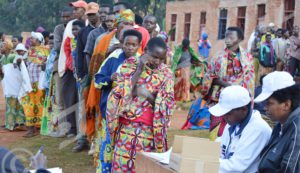 A ruling party executive is behind the bars for his political intolerance. Is it for the sake of easing tensions or willingness to conduct a safe referendum?
A ruling party executive is behind the bars for his political intolerance. Is it for the sake of easing tensions or willingness to conduct a safe referendum?
The other unknown is that of Burundians’ support for the ruling CNDD-FDD policy. Supporting the popularity of President Pierre Nkurunziza and his government.
A referendum is often perceived as an instrument for measuring the attachment of the population to the state or its desire for change and as a way to express its views on the way things are. A priori, one would think that Bujumbura government has done whatever it takes for the ‘Ego:YES’ to prevail. But there is a possibility that this magic secret vote could reverse the situation, a bit like David’s fight against Goliath.
And there is obviously the question of respect for the verdict of the polls. In case the ” Yes ” wins, that those who voted ” No ” accept the new deal. If the “No” wins, that Bujumbura conceal defeat.
The answer to this equation with three unknowns will make it possible to rule on the good or bad progress of this constitutional referendum, which is disputed by a certain part of the international community that sees much of President Nkurunziza’s desire to stay in power.
Written by Agnès Ndirubusa, Arnaud Igor Giriteka, Fabrice Manirakiza, Félix Haburiyakira, Hervé Mugisha, Pierre-Claver Banyankiye
translated by Pierre Emmanuel Ngendakumana

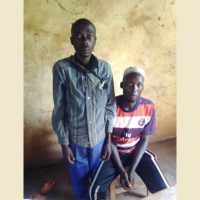
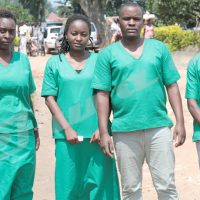
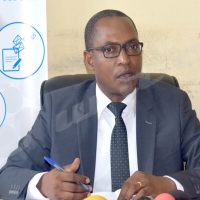

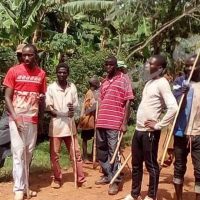













 IWACU Open Data
IWACU Open Data

